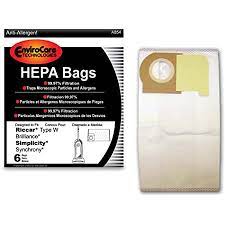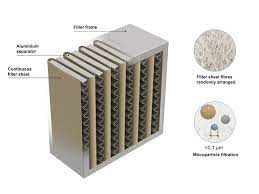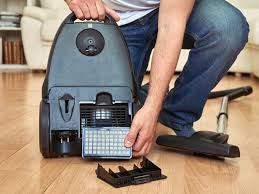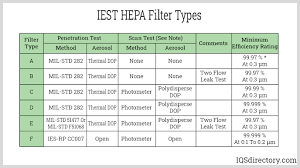If you’re looking for a quality hepa vacuum cleaner, you’re probably wondering what the bags are made of. Do they contain fiberglass? Is HEPA filter washable? In this blog post, we’ll answer all of your questions and give you some tips on choosing the right hepa vacuum bags for your needs!

What makes a Vacuum Bag HEPA?
True HEPA (High-Efficiency Particulate Air) filters, which are common in Haier and other brand-name high-efficiency particulate air (HEPA) vacuums, can capture extremely tiny particles. A real HEPA filter can trap 99.97 percent of all airborne particles with a diameter of 0.3 microns or larger.
What Material is Used for HEPA Vacuum Cleaner Bags?
Hepa vacuum bags are made of a special type of paper or cloth that is designed to trap dust and other particles. The porous woven fabric (typically paper or cloth) in these bags serves as an air filter. The paper is often treated with a chemical so that the tiny holes in the bag are big enough for air particles to pass through, but not large enough for most dirt particles to enter.

What Micron is HEPA filter?
The diameter specification of 0.3 microns responds to the worst case; the most penetrating particle size (MPPS).
Do HEPA Vacuum Cleaner Bags Contain Fiberglass?
The ULTRA-FAST filter uses hundreds of thousands of fiberglass filaments, which are small and sticky for particles that try to go through them. This tight weave of fibers then captures objects greater than 0.3 microns in size.
Why are HEPA filters Pleated?
The pleated HEPA design (which folds into a zig-zag form) allows for a larger surface area of HEPA filter material to be utilized in air purifier filters. This means the purifier is capable of filtering more air at once, which improves its efficacy.
Is HEPA filter Washable?
It’s also possible that you can wash or clean a HEPA filter and it will still function. However, there is no standard for washable HEPA filters, and there have not been any public tests done to see how well these filters work after they’ve been washed.

Are HEPA filters Toxic?
The controversy over HEPA filters has focused on worries that they may shed microscopic fibers and be harmful to health. However, more recent research have shown that HEPA filters are safe and no evidence of harm was found.
Do HEPA Vacuum Bags contain Asbestos?
High-efficiency particulate air (HEPA) filtered vacuum cleaners are the main instrument used to clean up asbestos-containing debris during operations and maintenance (O&M) activities. The replacement of vacuum bags might be a source of airborne asbestos contamination.
How many types of HEPA filters are there?
There are six types of combustors: A, B, C, D, E and F. According to the Institute of Environmental Science and Technology (IEST), in terms of performance, there are six categories: A, B, C, D, E & F.
Type A: Standard Efficiency Pleated Filters
Type B: High Efficiency Pleated Filters
Type C: Medium Efficiency Rigid Cell Filters
Type D: High Efficiency Rigid Cell Filters
Type E: Ultra-High Efficiency Particulate Air (HEPA) Filters
Type F: Absolute (HEPA-Equivalent)Filters

A typical home vacuum has a filter that is only about 80 percent effective in capturing smaller particles. To put that into perspective, if your vacuum had a true HEPA filter, it would be able to capture 99.97% of particles that are 0.30 microns or larger. The difference is significant, and it’s one of the reasons why people with allergies or asthma often prefer vacuums with true HEPA filters.
What is the difference between HEPA and true HEPA?
In general, a HEPA-type filter is capable of catching particles as small as 2 microns with a 99% success rate. True HEPA filters the competition by offering a better 99.97 percent efficiency rate at particles as little as 0.3 microns.
If you’re looking for a vacuum with a true HEPA filter, be sure to check the product specifications carefully. Some manufacturers use the term “HEPA-type” to describe filters that are not truly HEPA-certified. These filters may be effective, but they will not provide the same level of protection as a true HEPA filter.
In Conclusion
Whether you’re looking for a hepa vacuum bag to protect your health or simply want to keep your home clean, it’s important to know what you’re looking for. With so many different types and brands of hepa vacuum bags on the market, it can be overwhelming to try to choose the right one. But by understanding the different types of hepa vacuum bags and what they’re made of, you can narrow down your options and find the perfect hepa vacuum bag for your needs.
